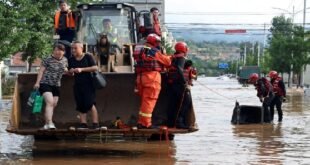09-05-2022
JEDDAH/ RIYADH: Saudi authorities resumed demolition of buildings in at least twelve districts of Jeddah, leaving hundreds of families homeless and without a place to live.
On Saturday, the Committee for the Undeveloped Neighborhoods in Jeddah issued letters to residents of the Bani Malik, al-Wurud, al-Mosharafa, University, al-Rehab, al-Aziziyah, al-Rawabi,  al-Rabwa, al-Mountazah, Quwaizah, al-Adl, al-Fazl, Umm al-Salam, and Northern Kilo 14 and ordered them to vacate in preparation for razing of the homes.
al-Rabwa, al-Mountazah, Quwaizah, al-Adl, al-Fazl, Umm al-Salam, and Northern Kilo 14 and ordered them to vacate in preparation for razing of the homes.
The committee had previously stated that it would halt neighborhood demolitions during Ramadan and restart work after the holy Muslim fasting month ended.
The demolitions are taking place amid strong opposition from local people. The recent events in Jeddah have also been regarded as forced displacement by human rights organizations.
Residents claim that Saudi officials are razing thriving, varied working-class neighborhoods that previously made Jeddah the most open city in the very conservative country.
“We have become strangers in our own city. We feel suffering and bitterness,” a Saudi doctor, who did not want to be identified for fear of retaliation from the authorities, said.
The doctor, who still had 15 years left on the loan he used to build his family’s “dream” home in Jeddah when bulldozers razed it to the ground, added that the prospects of renegotiating the loan or claiming compensation remain unclear.
 The operation is strongly believed to risk fueling anti-regime sentiment in the 30-plus affected neighborhoods, many of which housed a mix of Saudi nationals and foreigners from other Arab countries and East Asian states.
The operation is strongly believed to risk fueling anti-regime sentiment in the 30-plus affected neighborhoods, many of which housed a mix of Saudi nationals and foreigners from other Arab countries and East Asian states.
According to the London-based rights group ALQST, an independent non-governmental organization advocating human rights in Saudi Arabia, evicted residents had been living in their homes for up to 60 years.
Some were driven out when their power and water were cut off, or threatened with jail for disobeying an eviction order, it added.
A resident of Jeddah’s southern neighborhood of Galil, which saw the first demolitions last October, said security forces had confiscated mobile phones to prevent footage from getting out.
“We were suddenly expelled from our homes overnight and without warning,” said the man, who gave his name as Fahd.
Saudi officials have asserted that the kingdom will compensate families for their losses and announced in February that the government would complete 5,000 replacement housing units by the end of the year but residents, including those evicted early on, and complained that they did not  receive adequate warning or compensation when their homes and neighborhoods were demolished.
receive adequate warning or compensation when their homes and neighborhoods were demolished.
The Saudi authorities defined the areas that cover a substantial slice of the older parts of Jeddah as slums – vilifying them as dens of crime and vice.
Those living there have denied this, saying that they are long-established districts that provide affordable housing for the less well-off amongst both Saudis and expatriates
Their anger has produced a rare outpouring of protest in Saudi Arabia on social media platforms, such as Twitter and TikTok, bemoaning what they see as the injustice and inequity of the plan to transform the area.
Bulldozers have left a swathe of Jeddah in ruins, some have described the scene as resembling the aftermath of war. (Tasnim News)
 Pressmediaofindia
Pressmediaofindia




